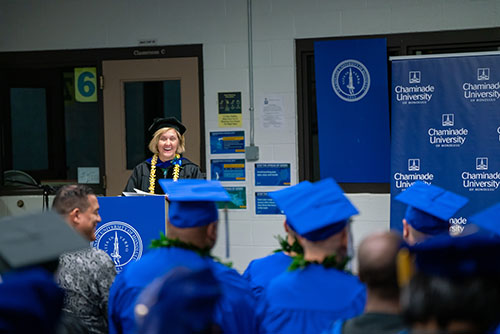Rachel Arakawa enters her final year at George Washington
She’s more accustomed to dispensing medicine than she is advice. So, when asked what she would advise students to expect when they’re in medical school, Rachel Arakawa ’20 offered this simple suggestion: “Keep focus on your goals. And remember, you are just as qualified as anyone there.”
During a casual information session with students enrolled in Dr. Amber Noguchi’s HP 390 class–Advanced Topics in Health Professions Preparation—Arakawa shared her journey to George Washington University’s School of Medicine and Health Sciences. Like many freshmen who entered college amid a global pandemic in 2020, the former Silversword soccer and tennis player had to decide whether to stay home or move to Washington D.C.
“Even though all my courses were going to be online, I decided anyway to move to D.C.,” said Arakawa, who hopes to do her residency either in the Maryland–Virginia area or on the west coast. “That first year was really tough because it was my first time being away from home, and I had six to eight hours of online lectures every day, and then another two to three hours of reviewing the previous day’s content. We covered everything I learned as an undergraduate in two months.”

Discipline and academic rigor, though, weren’t new to Arakawa. At the beginning of her sophomore year, the Kaneohe native decided to formally enter into an Articulation Agreement between Chaminade and George Washington University’s School of Medicine and Health Sciences.
At its essence, an articulation agreement document is a formal arrangement between two colleges or universities, outlining a structured transfer plan for specific program offerings. Depending on the program and degree, students have the opportunity to initiate their path towards advanced studies as undergraduates. This involves building a robust academic record and fulfilling prerequisites during their time at Chaminade. The agreement benefits students by guaranteeing the transfer of all completed classes (credits) and providing a clear pathway for ongoing academic progression.
Students who want to take advantage of participating in an articulation agreement, for example with George Washington University, should apply in January of their sophomore year. “This timeline avoids any gap year between undergraduate and graduate programs,” Noguchi noted. “Applicants are required to have spent two years (four semesters) in an undergraduate program of the contractual college and to have completed approximately 60 semester hours of course work by the end of the semester during which they apply.”
Articulation agreements streamline the transfer process for everyone involved. This will help alleviate the stress surrounding the application process, the credit transfer process, and several other issues students might encounter when applying to a graduate program. By simplifying this process with transfer agreements, it is beneficial to all parties involved.
Third year bio-medical major, Joshua Dumas ’25, plans to go to med school even though he didn’t pursue an articulation agreement. The aspiring physician’s decision was based on his preference to attend a school on the west coast so he can be closer to Hawaii and family.
“I was studying all winter break for the MCATs, but I decided to wait until I was better prepared,” said Dumas, a Regent Scholarship awardee and COPE Health Scholar with Adventist Health Castle. “It was inspiring to hear how her Chaminade experience helped her in med school, as I am sure it will help me.”
Now in her fourth year and two of three medical licensing exams behind her, Arakawa has applied to various residency programs and received 20 interviews. Her choice of post-graduate training will be in emergency medicine, a specific area that she has been interested in ever since she started her academic track in the health field.
“I did a lot of event medicine, like at concerts and marathons, and I really enjoyed it,” Arakawa told the students. “I get to look at trauma, but it’s not for everyone. You’ll have to find your own passion and specialty.”
Asked by sophomore Ku‘ulei Koko ’26 if she ever experienced the impostor syndrome, Arakawa unhesitatingly answered yes. “I am a first-generation medical student and the only Hawaiian–Japanese in my class,” Arakawa added. “Some of the other students were also more familiar with the social cues and mores of the medical field since they weren’t first gen. But, I overcame impostor syndrome by not comparing myself with others, and got involved with activities that I liked.”
Healthcare is indeed the perfect complement to Chaminade University’s mission. As a Marianist institution, faculty members educate their students to embrace adaptation and change, family values and community service, which are all core components of our healthcare system. And as a liberal arts school, Chaminade ensures that graduates have a wide breadth of knowledge and are able to think critically across a range of disciplines.
“I learned a lot during my years at Chaminade years—inside and outside of the classroom,” Arakawa said. “The small class sizes and the supportive faculty helped shaped my belief in serving the community and being an empathetic individual that can make a transformational impact.”




